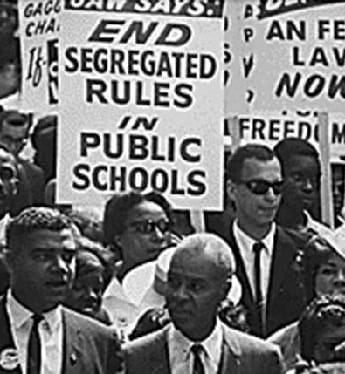Click here for a great selection of Amazon.com books about the Civil Rights Movement.
Black Civil Rights Movement Timeline - 1950s
- December 1, 1955 - Rosa Parks refuses to give up her seat on a bus to a white passenger and is arrested. This event sparks the Montgomery Alabama Bus Boycott.
- November 13, 1956 - The United States Supreme Court supports a lower court's decision, in the Browder v. Gayle case, which makes racial segregation on privately operated buses unconstitutional.
- August 29, 1957 - The United States Congress passes the Civil Rights Act of 1957. The purpose of the act was to eliminate barriers preventing black people from voting.
- September 24, 1957 - President Dwight Eisenhower sends the U.S. National Guard to Little Rock, Arkansas to ensure Little Rock Central High School in Arkansas is integrated and that "The Little Rock Nine" (9 African-American students) are allowed to attend school.
- June 29, 1958 - The Bethel Baptist Church in Birmingham, Alabama is bombed by the Ku Klux Klan killing four young girls.
Black Civil Rights Movement Timeline - 1960s
- February 1, 1960 - The Greensboro sit-ins begin. Four African-Americans refuse to leave a white only lunch counter at a Woolworth store in Greensboro North Carolina. This event would spark similar non-violent protest throughout the south.
- April 17, 1960 - The Student Nonviolent Coordinating Committee (SNCC) is organized in Raleigh, North Carolina.
- May 6, 1960 - President Dwight D. Eisenhower signs The Civil Rights Act of 1960. This federal law aimed to protect the rights of African-American's in registering to vote.
- December 5, 1960 - The U.S. Supreme Court rules, in the Boynton v. Virginia case, that racial segregation in bus terminals is illegal effectively making segregation on interstate buses illegal.
- May 4, 1961 - The first group of Freedom Riders, with the goal of integrating interstate buses, departs on a Greyhound bus from Washington, D.C. The U.S. Supreme Court had a few months earlier declared segregation on interstate buses illegal.
- May 2 - 5, 1963 - Hundreds of students in Birmingham, Alabama participate in the Birmingham Children's Crusade with the objective being to have a conversation with the mayor of Birmingham about racial segregation. The police used fire hoses and set police dogs on the peaceful protesters. The horrible images, which were televised throughout the U.S., helped gain support for the civil rights movement.
- June 11, 1963 - Alabama Governor George Wallace blocks the front of the University of Alabama attempting to stop the enrollment of two black students; he steps aside when confronted by federal marshals.
- August 28, 1963 - The March on Washington takes place during which Martin Luther King, Jr. delivers his "I Have a Dream" speech.
- January 23, 1964 - The 24th Amendment to the US Constitution was ratified. This law eliminated numerous barriers blocking African-Americans from voting.
- July 2, 1964 - The Civil Rights Act of 1964 is enacted. This law makes discrimination based on "race, color, religion, sex or national origin" in employment practices and public accommodations illegal.
- December 10, 1964 - Martin Luther King Jr. is awarded the Nobel Peace Prize.
- February 21, 1965 - African-American civil rights leader Malcolm X is assassinated.
- March 7, 1965 - Civil rights marchers participating in the Selma to Montgomery march are brutally attacked by Alabama State troopers and police as they attempt to cross the Edmund Pettus Bridge. This event has been dubbed "Bloody Sunday".
- August 6, 1965 - The Voting Rights Act of 1965 is signed into law by President Lyndon Johnson. This law prohibits discriminatory practices preventing African Americans from registering and voting.
- April 3, 1968 - Martin Luther King Jr. delivers his famous "Mountaintop" speech in Memphis, Tennessee where he has come to support a strike by African-American sanitation workers.
- April 4, 1968 - The great civil-rights leader Martin Luther King Jr. is assassinated in Memphis, Tennessee.
- April 11, 1968 - The Civil Rights Act of 1968 is signed into law by President Lyndon Johnson. The law requires equal housing opportunities regardless of race, creed, or national origin.
